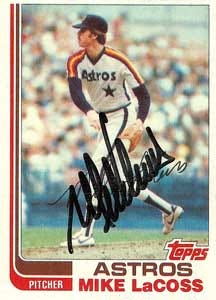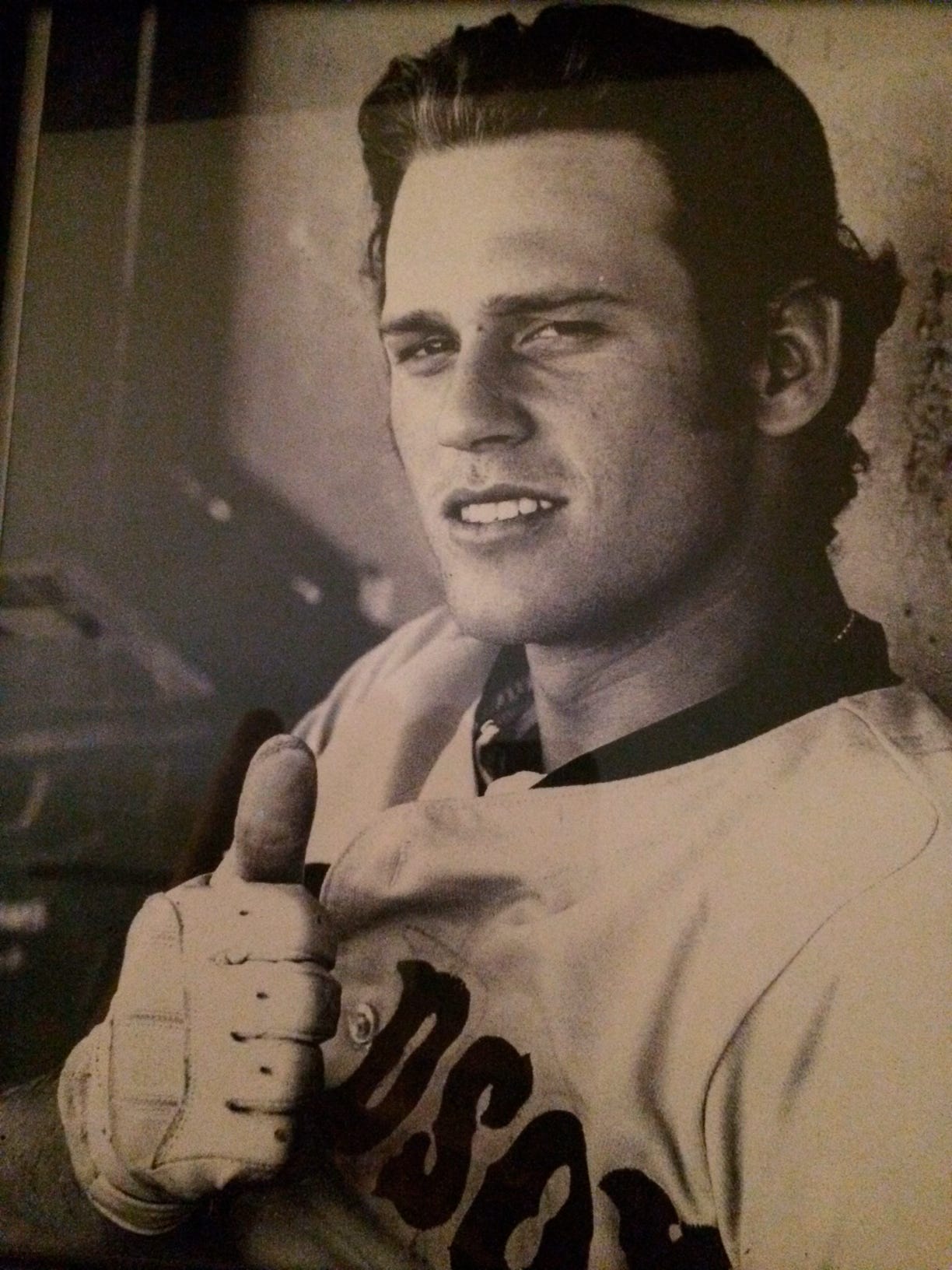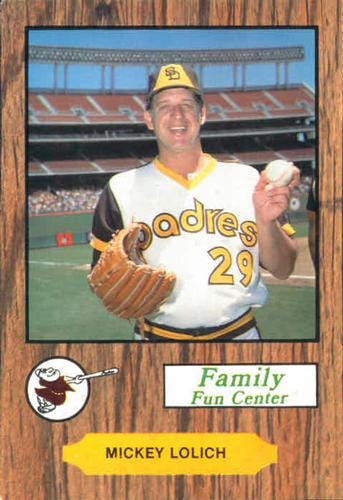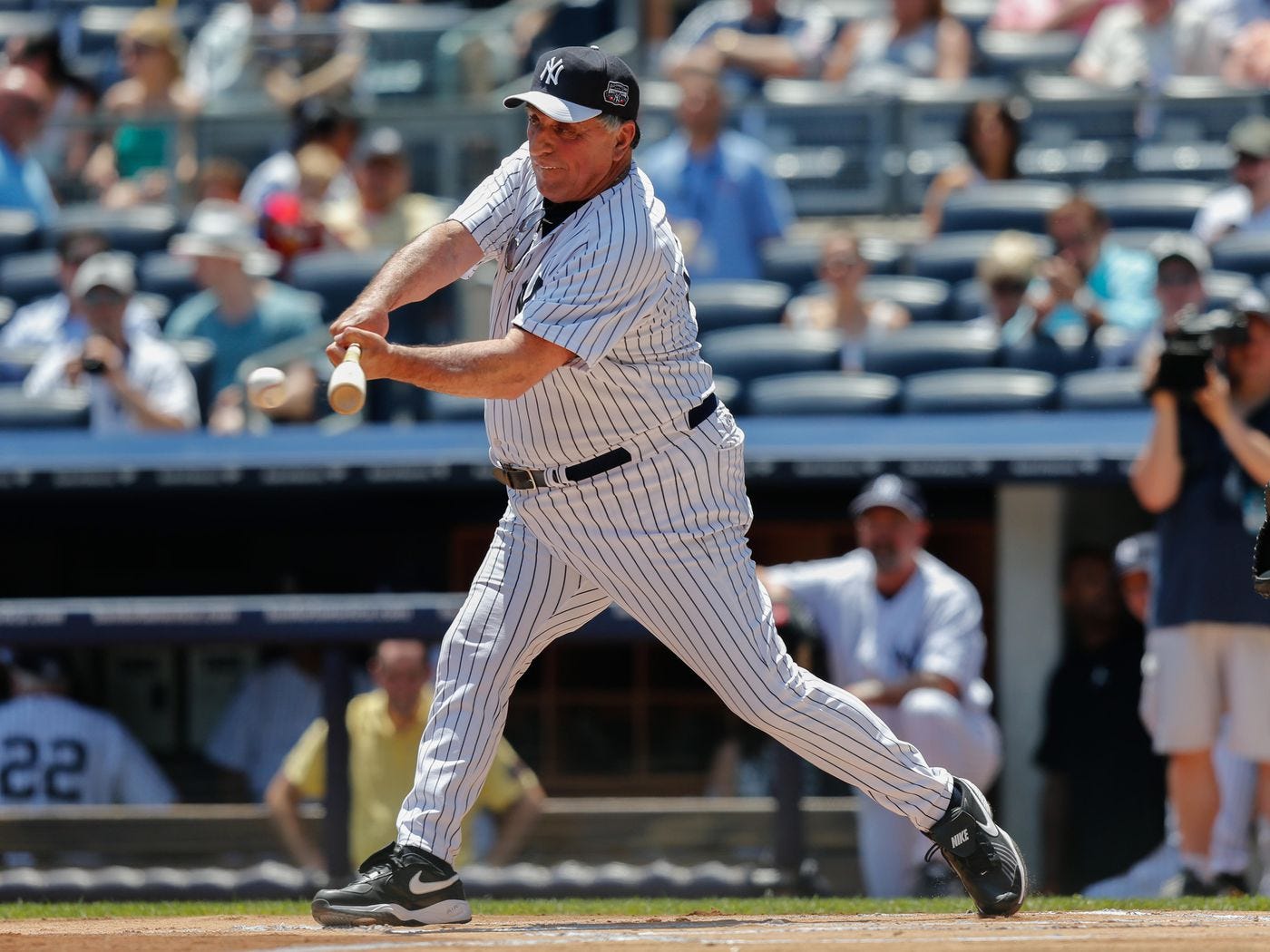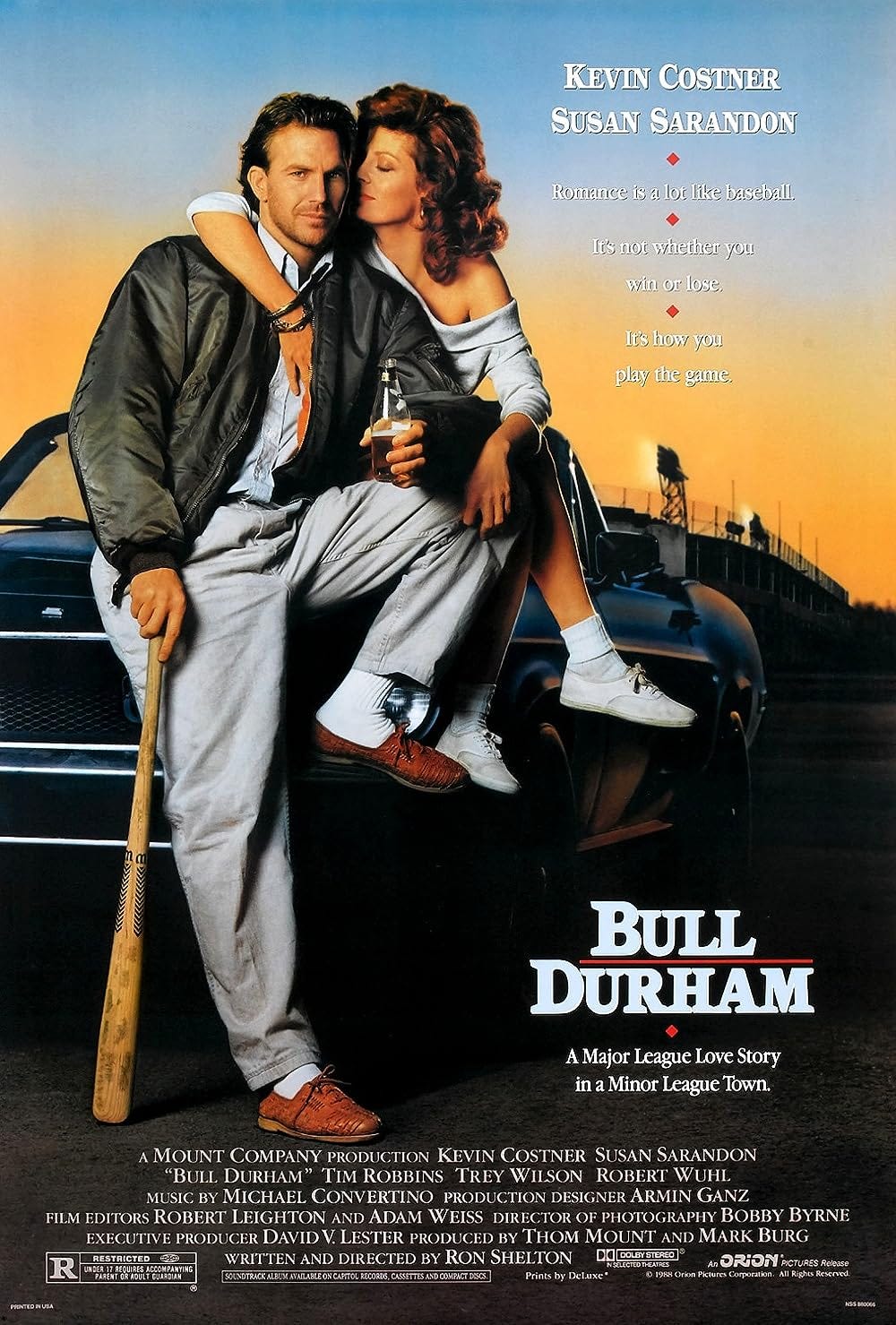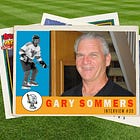Interview #36: 1974's Two-Way Prospect
Donnie Alfano, top draft pick of the San Diego Padres and lumber salesman
What happens when you take a top high school prospect who can run, hit, and throw heat from the left side, and draft him to a team whose front office is more chaotic than the Trump administration? You get the story of Donnie Alfano, once scouted to be a top pick in the 1974 MLB amateur draft as both a pitcher and a position player, only to be drafted by an inexperienced San Diego Padres organization who couldn’t decide which side of the ball to keep him on.
He ultimately played five seasons of minor league baseball from rookie ball to triple-A. He had nearly 1,000 plate appearances and pitched 144 innings in 69 games as he was moved from the bullpen to first base and back again. He had good stretches, hitting .314 with 74 RBI for the Reno Silver Sox in 1975 as a 19-year-old, and then going 8-1 with a sub-2.00 ERA in winter league that same year. In the end, he was tossed into the bullpen, overused and hurt his shoulder in an era where that was much harder to repair and he left pro ball in 1978 at the age of 22.
While he was bitter over the way his career went for a few years, he has gone on to a successful sales and business career while doing everything from selling lumber to managing sporting goods stores to fighting forest fires and now makes cutting boards for old ladies. In the 1974 draft he was the first pick of the second round, so every team in the league had a chance to pick him. A different franchise, or even a different era, and things might have been much different. It was interesting to hear his draft and scouting experience in comparison to the billion-dollar business amateur baseball has become today.
Drafted and the Minor League Experience
So I did some research into your career. You were drafted as a two-way player?
Half the teams were after me as a player, half of them were after pitching. I just happened to get drafted by one that wanted me as a player.
It looks like you did both.
Yeah, I did. That's the problem with the Padres. They didn't know what the hell to do with me because I could do both really well. That was a disaster, actually.
The Padres or your career?
Well, kind of both. But thanks to the Padres. They were very young, four years in existence at that time. Very poorly run. Buzzie Bavasi was the president. Mike Port was the minor league guy. All these guys were dudes that nobody wanted. My dad warned me. He goes, ‘Why don't you go to city college and wait another year and get drafted by somebody else? These guys are clowns,’ and I, being a young kid, 18, shit, all I care about is getting to the big leagues.
(note: Buzzie Bavasi was the founding president and part-owner of the Padres. Mike Port was the minor league GM and eventual Director of Player Development for the Padres, and went on to be MLB’s VP of Umpiring)
Did you have offers with universities?
Oh yeah, just about anywhere I wanted to go. Arizona State bugged the hell out of me. All the baseball schools, and then I had a full ride to go to Pepperdine for basketball. I figured out I was too white and too short to play basketball for a living.
Did they offer enough of a signing bonus to make city college not worth it?
Back then it was big, $25,000 plus my incentive bonuses. Number one picks only got $100,000 at that time. I was highly recruited as possibly number one. Probably half a dozen teams called me the night before the draft and asked me if they drafted me #1, what would it take to sign me, and I'd say, draft me and we'll find out. We didn't have agents back then. The scout’s the one that signed me, and he's running out of the house with his typewriter down to the payphone because every time I say no, I'm not going to sign for that, you have to run down and call Buzzie and Mike. It was a whole different ball game back then.
So everybody had a chance to get you before the Padres took you.
Yeah, they did. It was very, very interesting. The Orioles and the Philadelphia Phillies were very interested, and the Reds. All of them worked me out. It was crazy. My senior year, the last two or three months, was just nuts. I was going to workouts every weekend and running the 60-yard dash and all that kind of shit and hitting and throwing and pitching. Three of them came to me the night before the draft and said if they were going to draft me number one, what's it going to take. And they passed me.
It was a weird deal. I don't know whether there was some stuff done under the table, because I was the number one pick at the beginning of the second round. So who knows what goes on. I think there's some shit that goes on because it was pretty weird. I’m thinking I'm going to be #1. Plus the Padres were considering me as the number one. They kept tossing that around me; finally decided on Almon.
(The 1974 #1 overall pick was Bill Almon, who had a 15-year career playing for 7 teams and appeared at all 8 positions in the field.)
Were there a lot of agents back then?
There weren’t many of them back then. Nobody really came looking for me. They only focused on the big league guys. Bill Almon had an attorney present because he was a Brown University graduate. They had some sharp dudes that were businessmen. I had nobody. Little hick town of Visalia, 30,000 people; Marty Keough comes pulling in here with his little typewriter getting me to sign a baseball contract.
(Marty Keough was the director of West Coast scouting for the Padres from 1975-76. He also had an 11-year MLB career with the Red Sox, Indians, Senators, Reds, Braves and Cubs.)
All these teams besides the Padres were looking at you as either/or, a player or a pitcher?
Yeah, I think the Reds wanted me pitching right off the bat. They weren't even gonna fuck with me playing. They wanted a left-handed pitcher. I think the Phillies as a player and I can't remember what the Orioles wanted me for. I mean, we used to have, dude, no lie, my senior year, me and (Mike) LaCoss, we used to bring in 60 to 70 scouts every freaking Tuesday and Thursday afternoon when we played high school. I mean, it was nuts. He went in the third round, we were highly scouted.
(Mike LaCoss also played four Mt. Whitney High School with Donnie. He was drafted that same year by the Reds in the 3rd round, pitching for 14 years for the Reds, Astros, Royals and Giants.)
Did it help to have your dad there with you during the draft because he'd been through it?
No, dad was not a businessman at all. It was strictly like, let’s just hold out until we get what we want. We had no plans to go to college. I hated school. I could have went for one year, probably tolerated it. Dad played professional ball but it was totally different. My uncle was with me, he played for the Red Sox for a couple of years. The whole ordeal with the Padres was pretty much… there's only a couple of good memories I had in the five seasons I played. The Padres, you know what the problem was, a lot of them were drunks.
You go to spring training and the triple-A coach is a total drunk. The guy was drunk every day at spring training games. A lot of the coaches, all they did was drink. I was just a kid; I'm thinking nobody drinks when they play baseball because I was pretty naïve. I was kind of in the dark with all this stuff. I used to think that these guys were freaking nuts, smoking and drinking and shit. Beer in the locker room after the game. I'm going, what the fuck? It was really trippy. I wasn't really ready for it, to be honest with you.
So you get drafted in ‘74 and you get sent to Walla Walla. What was that like?
First time being away from home, living in a hotel. All of a sudden I'm playing with college guys. I was always the youngest guy on the team. It was different. I wasn't quite prepared to go out in the real world. That's why now, when people ask me about pro ball, I say have your kid go to college and get that experience and being away from home, playing with strangers, playing with guys that are older, that kind of thing. I had none of that. Not that I was homesick, but it’s just different ball and it's different when you play with guys that are older. These guys are coming and drinking beer out of the cooler and, I'm not kidding, I used to think to myself, shit, we'd be expelled from school if we did that.
Walla Walla, I made $500 a month. Lived in a hotel and I used to send $200 a month back from home to my parents to put in the bank. The following year, they bumped me up to $700. I held out for $75 more. That's what I figured I needed because I had gotten married and that's what I needed to survive. So they ended up giving it to me. $775 bucks, that was 1976.
It was cool. Bus rides were not that great. You learn a lot. I mean, I remember in Amarillo, TX, bus rides used to have court. We'd have attorneys and the judge. And if you're late to batting practice, you'd have to go to court the next day on the bus. You'd get punished, fined maybe $3, $5. That was a lot of money back then, five dollars was our meal money for the day.
And you played in Alexandria, Louisiana? Man, that's in the middle of nowhere.
It's a suck ass place man.
That’s gotta be total culture shock to go from California and then in ’76, had the news of the Civil Rights Act gotten there yet?
Amarillo was a little bit like California, except for hailstorms and tornadoes. Louisiana was a big time culture shock.
Alexandria was a shithole. We had a trailer for a clubhouse. I don’t know if you've been in Louisiana, but the bugs would eat you alive in the outfield, and I was playing right field my second year. It was a miserable freaking place. It was racist as hell; you had the black people on one side of town, white people on the other side of town. Nobody went over there, they didn't come over here. I mean it was nuts. Playing right field and just trying to focus on playing, it was like, give me a break, this place is a shithole. It was hot as hell, muggy as crap. You’d take a shower, you couldn't even get dry. I just basically said, look, if you don't get me the hell out of here, I'm going home. They sent me to Reno and I had a great freaking year in Reno. We won the pennant. That whole team went to the big leagues, except for me. I was playing first base, hit .307, hit some dingers and quite a few RBIs. If I would have played a full season, I might have had a pretty damn good year really.
That was ’75. In ’76, I break camp, go to Amarillo as a player. Bob Miller managing. I used to throw batting practice to everyone because when we faced a left-handed pitcher, he wanted me throwing batting practice so guys could get used to it. And he goes, ‘What the fuck are you doing playing first base? With an arm like that, you'd be in the big leagues in two years.’ So he makes a phone call to the front office, and all of a sudden they have me pitching, and playing. Sometimes I’d play first base, I’d play right field and then I’d pitch a couple innings.
Amarillo, I did OK. I used to do really well. I won a lot of games for us cause they pinch hit me. And I'd always come through and so my name was Mr. Clutch. They used to have headlines from Amarillo: Mr. Clutch comes through again. If the right person would have got ahold of me when I was younger and stuck with me and said, look, you're going to go out there and you're going to play no matter what you do, don't worry about it, just go and have fun and play… it probably would’ve been a whole different ballgame. But they were so… emphasized hitting for an average. You don’t hit over .300 you're a fucking loser. So you put all this pressure on yourself to perform.
Yeah, 1976 was 81-54, that's pretty good.
We were badass. I just struggled through that season. And then in 1977, I go to winter ball and I have a manager and he goes, I'm putting you out there every five days and you're gonna pitch. I don't give a shit how bad you get ripped; you're gonna pitch at least five innings no matter what happens. I'm like 8-1 with a 2.00 ERA at the end of the season. I don't even make the All Star team. There's 3 or 4 guys that make the All Star team as pitchers and I wasn't even mentioned. Nobody's even close to what I did.
The papers write me up in San Diego that I'm gonna have a good shot as one of the 10 pitchers for the San Diego Padres in 1978. I go to spring training and John McNamara’s the manager. He gets fired in the middle of spring training. And then they bring on Roger Craig, who's another big prick. They all talk about how great a guy he was because he taught Randy Jones the split finger and all that bullshit that came from him, it's a lot of garbage, but anyway...
I go to camp and he's got the good old boys. The good old boys, they don't have to run, like Rollie Fingers and Gaylord Perry and Randy Jones and Dave Friesleben and all these guys. They don't run shit; you know, every morning we have to run like two or three miles, they just kind of jog through it and stop halfway and shit. I pitched one damn inning the whole damn spring training. And I'm talked about to maybe break camp with these guys, you know, good left-handed pitcher.
I remember people sent me a couple articles from the San Diego Union Tribune talking about me breaking camp. Then I throw one inning and then they send me to Hawaii, triple-A. I get down to Hawaii and then there's another manager there, Dick Phillips. And he's got his favorites, so they put me in the pen to relieve. Mickey Lolich took my spot that year. Forty years old, or 39 (note: 38), fat fuck, could hardly even freaking run from home plate to first base, and he's trying to make a comeback.
The Padres signed all those aging stars back then, too.
That's what they did. And it never worked for ‘em. They keep signing these guys that are already peaked out, on the backside of the hill and then they threw us young guys down the road. If you go back in their history, when I was with them, I think we won the pennant in every minor league team twice, I think. I know in ‘76, I think we won every league. Every minor league team won the pennant and the big league team was last place.
He was great at one time, but he's done. They break camp and they give him the job. So I go to Hawaii and I'm hardly even pitching. In May, the big shots come out to see us in Phoenix and they asked, why isn’t Alfano pitching? We need him pitching. If Lolich gets hurt, or one of our lefties up there, he's going to be our first guy called because I was the only left-handed pitcher in triple-A. So all of a sudden, oh shit, and they pitched me three nights in a row.
I hurt my arm the third night against the San Jose Giants. The next spring training, I went back as a player because I couldn't throw. I could make the throw from first base to the second for the double play, but my arm was pretty fucked up, my shoulder. So I said fuck this pitching shit, I get in shape during the winter time with my dad to go hit. I make the triple-A team as a first baseman. You know what happens? They release me.
They give the job to Joe Pepitone. Another guy who’s 41 trying to make a comeback. He was Mickey Mantle’s roommate. He's 41 years old at the time (note: 35), so they released me and I'm done. I was so bitter about baseball, they took the love of the game out of me and made it a job. When I went into baseball I loved it, and I left hating it.
There's a couple teams that were interested in me as a pitcher, get your arm fixed up and get back in shape, we might be interested. They operate on my shoulder, but it's not the same. I had nobody to rehab me, nobody to help me out. They just sent you back home, I was on my own. It was an interesting time. I came back and I was so bitter. I didn't watch or even want nothing to do with baseball for about 10 years. And now I don't even give a shit about it, you know, I mean, it's like, whatever, I had my time in the sun and it's over. Done.
That's back before they came out with the scope; one year before they came out with the scope. Because Jobe and Kerland were the ones that invented scope. They came out with it the year after they operated on mine. So they had to cut me, like they took my arm off and put it back on. You do the scope now, you’re throwing in six weeks, eight weeks. Took like 6 months to even soft toss.
(Frank Jobe was the surgeon who performed the first Tommy John surgery. He, along with Robert Kerlan, specialized in sports medicine together. Jobe also pioneered shoulder reconstruction surgery that drastically reduced the amount of trauma to the shoulder during the procedure, his first MLB patient was Orel Hershiser for this.)
I got it all fixed and went down the Dodgers, they wanted to talk to me about pitching. I went down there and threw down in the bullpen to Steve Yeager one day. And I was throwing at 88 to 90, but I wasn't even really that good of shape. Just had my surgery like a year before that, but they didn't sign me, they said we can't do it, we’d have to find room down in triple-A. I just told my dad, let's get the fuck out of here. So we walked off Dodger Stadium and I'm even more pissed off and bitter because I couldn’t find anybody to give me a chance and I was 24. I was too old.
I gradually have kind of gotten back where I kind of love the game again. But it's not the same game. It's a lot faster, guys are stronger, all the guys with the gold chains and all the earrings and all that bullshit. I'm old school. It's kind of ruining the game, I think. Pretty soon they're gonna have freaking robot umpires, that's just around the corner. It’s changed a lot, dude.
What was it like trying to hit and pitch?
It's very hard. You have to hand it to (Shohei Ohtani). It's amazing. I can see why he probably hurt his arm. It was very hard, very difficult to focus, it's hard enough to do one good, let alone two good. Different circumstances, who knows? It's just too much work. It's too much travel, too many games. You wear yourself out.
With Ohtani, he only played like 100 games as a hitter, and he'd pitch every 6th or 7th day, and then he still broke. So they were trying to play you both ways while everyone else gets to focus on one thing.
You know what's funny, one manager would like me as a player, one would like me as a pitcher. It was tough. I threw high 90s, just dicking around in batting practice. They’d say turn it on a little bit, and I’d throw like low 90s, mid 90s to these guys. I wasn't even working out as a pitcher. I had a great arm; when I hurt it, I was shocked. I could crank one up to 98 at the most. That was a great feeling, dude, you're out on the mound throwing it by guys. The higher you get up in pro ball, you have to keep them off balance, but in lower leagues and in high school, it's so much fun throwing the ball by guys. I was giggling out there.
Sounds like it just sucked the baseball love out of you.
Yeah, it wasn't what I expected it to be. I kind of lost the love of the game playing with the Padres. It kind of sucked it right out of me just because of the way they treated me. I got sent home from winter ball when I was playing right field. I dove for an outfield ball, missed it, went to the wall and was running into the dugout. The manager jumped my ass, ‘you run like a fat ass,’ and I turned I go, ‘fuck you, you son of a bitch.’ I got in his face. So they sent me home.
Lucky I didn't hit him, but it so happened to be that Bavasi was right there in the stands, watching the whole thing, so they sent me home early. Wish I would have never signed with them. But you know you're stuck back then with them for five or six years.
There’s a lot to take in, there. First, how much luck plays a part in the career paths of players. Would Donnie have been an all-star if he’d been selected as a LHP and developed correctly? Who knows, but his odds would have been greatly improved. Instead, he was passed around from manager to manager all over rural America and no one could decide if he should be hitting or pitching. Today, I bet he’d take pitching. A lefty with upper 90’s velocity, that’s a $100million career path.
If you look at the 1st round picks in 1974, there are some good ballplayers who went to franchises with better reputations than the Ray Kroc-owned Padres. Dale Murphy to the Braves, Garry Templeton to the Cardinals, Lance Parrish to the Tigers, Rick Sutcliffe with the Dodgers. Think what the NFL would be like if Tom Brady was drafted by the Bears. He’d have been out of the league in 5 seasons. So it was rough enough to be picked by a clueless organization, but also to never have the comfort of focusing on one area of the game. Imagine being 18, 19, 20 years old trying to learn to hit professional pitching one month and a month later you’re across the country and now you’ve gotta learn how to get professional hitters out.
Also, not just location, but timing. A can’t-miss two-way prospect in 2024? He’s gonna have hours of scouting footage, agents, nutritionists, strength coaches, endorsements, elite coaching, college programs promising the world, comparisons to Shohei Ohtani. 50 years ago, it was just, hey here’s a contract, sign it and we’ll send you to the Pioneer League. See you in a couple years when you’re ready for the big leagues. For a sheltered kid from a small town in central California, you’ve gotta learn how to play pro baseball while also meeting people with whole new personalities and backgrounds that you didn’t know existed and playing in towns that might as well be foreign countries and everyone is trying to get themselves ahead.
There are some parallels to his hero, Mickey Mantle. Mantle grew up in a tiny mining town in rural Oklahoma sheltered from the outside world. He got tossed into New York City and was introduced to a life he could never have dreamed about. It speaks to how much raw talent he had that he carved a legendary career out of all the injuries, partying, drinking and poor health decisions that players today would never even think of trying.
Starting over at 24
What’d you do after that?
The day after they released me, I flew home, got out of the plane, opened up the paper and there's a manager training job for Big 5 Sporting Goods. I went to work the following week as a manager in training for Big 5, got hired, and in two years I was managing my own store. I had guys kept asking me, why don’t you go back and play ball? And I said, you know what, dude, I'm making $38,000 a year. This is 1981. I'm making freaking $38,000 a year, I got all the benefits, I ain't leaving this job. To go do what? The minimum at that time was probably $38,000 in the big leagues. It was $24k when I was there, 1975. It's funny because my arm came back a little bit and I used to throw to one of the guys, he was a high school baseball player and he worked part-time for me. We’d grab a glove out of the inventory and we’d start playing catch. He'd catch and want me to throw. It could have been like that movie (The Rookie), the high school players kept telling him to go play.
I did that for quite some time and then I built homes. After I got out of that, I moved up to Washington, got divorced, came back home and I started doing construction. Fought fires for a couple seasons jobs for CDF. I kept trying to find stuff that would challenge me, because coming out of baseball you want to find something that kind of challenges you. So I thought fighting forest fires would be kind of cool.
So I did that for a while. I used to go in on helicopters, drop us off and go put out spot fires and shit like that out in the boonies. I went to work in the hardware business and I loved it because it was stimulating. It was a challenge to sell. I bought and sold lumber and I had a 50,000 square foot warehouse with 40 employees and I’d do all the buying and I had a sales crew and all that kind of shit. So it was fun. I had a trucking company. I was in charge of all logistics and all the bullshit. It was like my own business but it wasn't my money. It was a lot of fun working my way up in that company; made a lot of freaking money and did really well.
Worked out for you.
I got a great life. I just went back to Amarillo for a reunion two years ago, it was a blast.
They do minor league reunions?
Yeah, we won the pennant back in ’76. So they asked us all to come back because they had a brand new stadium they built.
They’re the Sod Poodles now.
Yeah, yeah, whatever the hell they're called. Some stupid-ass name. But the stadium is gorgeous, and we got to see the old stadium, and they interviewed us out there. Media came out there, it was a kick in the pants. Got to see all the old guys. It was a lot of fun, man, bringing all those memories. ‘76 was a great year, anytime you a pennant it’s blast.
So you guys were pretty close as a team then? Was it anything like Bull Durham?
Very much so.
Except the woman.
There was always Baseball Annies. They would come to the hotel room, they were always hanging out. Hang out at the ballpark hoping to hook up with some ballplayers that they think might make the big leagues. The bus on that damn show looks just like the bus we had in Texas. I ain’t shitting you, I thought, oh my God, does that bring back memories. Coming out of the bus with our pillows and our blankets and our suitcase. It's very much like that.
And I know Kevin Costner, we went to school together. High school. I was just out on the set with him. His new movie right there at the ranch, right before you go into Zion National Park is a big ranch right they’re using for a set and me and my buddy went and saw him and sat on the set, hung out with him for the day. It's pretty cool. Yeah, he loves baseball, that guy. He's a baseball freak.
He didn't ask you for any help when he did Bull Durham, did he?
No, he didn't. I'm surprised. Yeah, I'm surprised he didn't. Because, he knows me. We're not best of friends, but he knows me. I was just out there with him and we always end up talking about baseball and bullshit. But he loves the game, that guy.
And you've done pretty well with your business career. So did that experience in baseball help your post-baseball career?
Yeah. Well, I'm very competitive. That's why I've been in sales. Sales is where I could compete and excel because I'm competitive and I looked at it like a game. When I used to go out and sell, even though I managed the branch and ran the branch, I had to have a territory. So it was fun trying to sell those guys. I'd categorized all my customers into four birds, the dove, rooster, owl and eagle.
They have all different personalities. So when I pulled up in front of one of these big customers, I mean, these guys made furniture, some were big furniture manufacturers, cabinet manufacturers, stuff like that. So I would want to know how to treat them when I walked in the door.
An owl’s real analytical, they don't give a shit about the number at the bottom line, but they're loyal. The rooster shoots from the hip. He'll buy from you this day, but the next day he’ll send you down the road. Or if you don't get the sales from him right then, the next person walks in the door is going to get it, whoever’s got the better deal. And then the eagle’s usually the owner. Very egotistical, narcissistic ass. You got 5 minutes to make me a sale, I gotta go, I don't have time for you. There's numerous times I've been kicked out; out of spite I just kept on going back. And then the dove, somebody's passive, or very religious people. You got to be careful how you talk, you can't talk real loud, you can't get in their face, you have to talk softer and you can't say cuss words. It was fun, that kind of stuff was challenging. I'm sure baseball made me who I am. I learned so much from all the different personalities I've dealt with.
All the guys that I couldn't stand I stayed away from. The guys that I loved I jumped in with them. It taught me how to deal with people and that's why I got into sales.
Donnie isn’t bitter at the way his career, I think just talking about it with me it might seem that way because it’s obvious how poorly he was managed. I can’t blame him for leaving the game after his experience and wanting nothing to do with it for so long. But as impressive as it was to see him go from high school draftee to all-star on both sides of the ball in the minors, it was even more impressive to hear about his post-baseball career path. He graduated high school, spent 5 years riding buses in the minor leagues and came out the other side 24 years old with no real-world job experience or higher education. And he took every job he ever had and made himself a success in spite of that delayed start.
Also, just like Gary Sommers from earlier, the competitive gene and being good at sales shows up again. I did like the “clients as birds” description. I’m gonna start describing the guys on my hockey team as birds, although most of our guys are pigeons.
And finally, how awesome would it be to be in beautiful southern Utah talking baseball with Kevin Costner?







